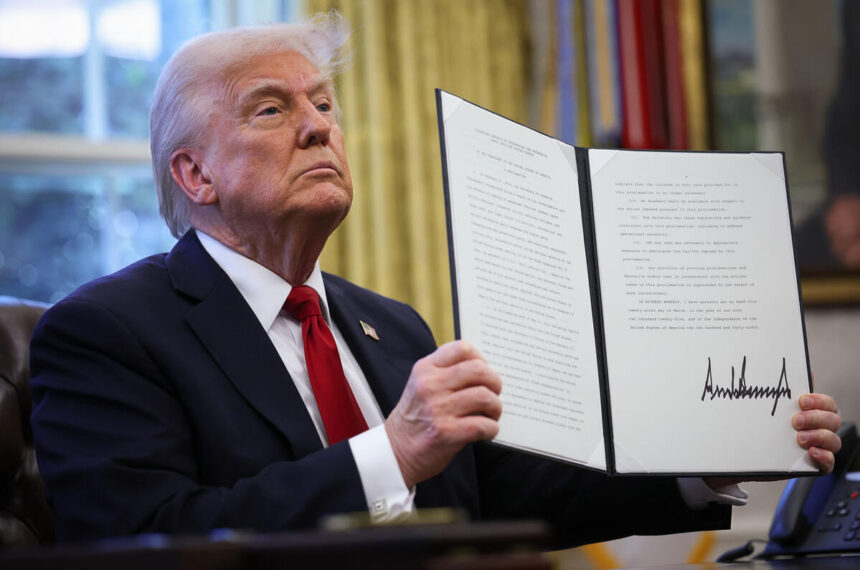US President Donald Trump’s plan to introduce “reciprocal tariffs” this week has sparked backlash from trade partners, with economists warning of significant economic consequences. An trade expert in China stated Trump’s move could severely disrupt global free trade.
According to Bloomberg, the announcement will be made during a White House event on Wednesday, Press Secretary Karoline Leavitt declined to provide specifics on tariff rates or which countries would be targeted.
Earlier this week, the US released a lengthy report outlining foreign trade practices it claims are barriers.
Critics argue this document serves as a justification for imposing tariffs. Li Yong, a senior research fellow at the China Association of International Trade, called the report a biased tool to promote protectionist policies.
He stated that such actions harm the global trade system and only benefit US interests.
Global Trade War Over Trump Tariffs
Trade partners have already expressed frustration. European Commission President Ursula Von Der Leyen warned that while Europe prefers negotiation, it is prepared to retaliate if necessary. Economists from Aston Business School estimate that a trade war could cost the global economy $1.4 trillion in welfare losses.
Other nations are also assessing the situation. South Korea announced plans to study the report and prepare appropriate responses. Meanwhile, Australia’s government has pushed back against US criticism of its pharmaceutical, biosecurity, and media regulations.
Prime Minister Anthony Albanese stated those policies would not change under his leadership.
China has been vocal in opposing US tariffs, emphasizing that trade wars benefit no one. Foreign Ministry spokesperson Guo Jiakun highlighted that the US tariffs violate WTO rules and damage global trade systems.
The US has accused China of restricting market access and offering unfair support to domestic companies, claims that Chinese experts call unfounded. He Weiwen of the Center for China and Globalization pointed out that industrial subsidies are common worldwide and that the US itself makes extensive use of them.
China’s Ministry of Commerce previously called the US tariff plan a unilateral move that disregards decades of multilateral trade agreements. Officials argue such actions undermine the balance of interests that international trade relies on.
S&P 500, Nasdaq Close Higher After Uneven Trading Day
Stocks ended Tuesday on a positive note after a choppy session, as traders waited for updates on potential new tariffs from the Trump administration. The S&P 500 gained 0.4%, and the Nasdaq Composite climbed 0.9%.
Meanwhile, the Dow Jones Industrial Average slipped slightly, as all major indexes swung between gains and losses throughout the day. This follows Monday’s mixed results, where the Dow and S&P 500 overcame early losses to post small gains.
March proved difficult for stocks, with the S&P 500 and Nasdaq Composite recording their largest monthly losses since 2022. Concerns over the potential effects of tariffs and fears about the economy’s stability weighed on investor confidence.
President Trump is expected to reveal sweeping new tariffs on Wednesday, but the lack of specifics has made markets uneasy. There’s growing worry that the measures could drive inflation higher and slow economic growth.
Investors also digested weaker-than-expected reports on manufacturing activity and job openings. Friday’s release of the March jobs report by the Labour Department is shaping up to be the key economic update of the week.
The 10-year Treasury yield dropped to 4.16% from 4.25% on Monday. Earlier in the day, it fell as low as 4.13%, its lowest level in a month. Lower yields often impact borrowing costs, including mortgage rates.
Tech Stocks Lead Gains
Major tech companies performed well, with Tesla gaining nearly 4% ahead of its first-quarter delivery report. Microsoft, Nvidia, Alphabet, Amazon, and Meta each rose over 1%, while Apple and Broadcom saw smaller increases.
Adtech firm AppLovin surged nearly 7%, leading Nasdaq gainers. Investors appear optimistic about its future despite recent struggles in the tech sector.
Bitcoin also saw gains, trading around $85,300 after dipping to $82,200 earlier in the day. MicroStrategy, one of Bitcoin’s largest corporate holders, jumped 6% on the news.
Notable Declines
Johnson & Johnson shares tumbled 7.6% after a court rejected the company’s proposal to settle lawsuits related to its talc-based products. This marks a significant setback for the company, which now plans to defend itself in traditional court proceedings.
Airline stocks also faced pressure after Jefferies downgraded Delta, American, and Southwest. Southwest dropped 6%, while Delta and American fell over 2% each. The downgrades come amid softening travel demand and concerns about potential tariff impacts.
Commodity Prices
Gold held steady at $3,150 an ounce, maintaining its record-high levels from earlier in the day. U.S. crude oil, represented by West Texas Intermediate, slipped 0.5% to $71.15 per barrel.
S&P 500 Movers
Top Gainers
- Vistra surged 4.1%, rebounding from losses last week. The power company is gaining attention for its potential to support energy-intensive AI data centres.
- PVH Corp., which owns Calvin Klein and Tommy Hilfiger, soared 18% after reporting better-than-expected sales and profits. Ralph Lauren and Tapestry also saw gains of 3.7% and 3.5%, respectively.
- Tesla rose 3.6% ahead of its delivery report, with positive buzz surrounding its Model Y sales in China.
Biggest Losers
- Johnson & Johnson led declines, falling 7.6% after its settlement plan for talc-related lawsuits was rejected.
- Southwest Airlines tumbled nearly 6% following a downgrade by Jefferies, which also lowered ratings for Delta and American Airlines.
- Warner Bros. Discovery fell 4.8%, as the company announced changes to its board amidst ongoing restructuring.
Tesla Edges Higher Before Delivery Data
Tesla stock climbed 3.6% ahead of its delivery report, expected Wednesday. Analysts predict 393,000 deliveries for the first quarter, reflecting a slight increase from last year but a decline from the previous quarter’s 495,570 vehicles.
Tesla has faced challenges in Europe and China, with EU vehicle registrations down 50% year-over-year in the first two months. Sales in China also fell significantly in February. The company’s stock is still down about a third this year.
CEO Elon Musk’s involvement in the Trump administration has stirred political backlash, which some analysts say may be affecting Tesla’s performance.
Related News:
Nearly 45% of Tesla’s European Sales Fall Due to Musk &Trump Connection

Geoff Thomas is an award winning journalist known for his sharp insights and no-nonsense reporting style. Over the years he has worked for Reuters and the Canadian Press covering everything from political scandals to human interest stories. He brings a clear and direct approach to his work.














